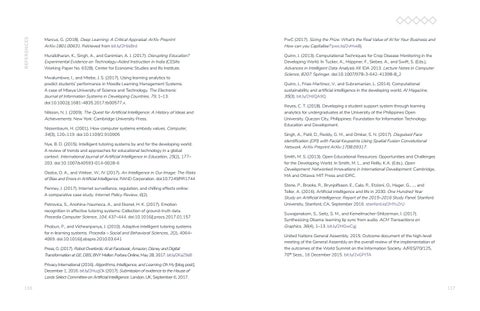REFERENCES
Marcus, G. (2018). Deep Learning: A Critical Appraisal. ArXiv Preprint ArXiv:1801.00631. Retrieved from bit.ly/2HJsBrd
PwC (2017). Sizing the Prize: What’s the Real Value of AI for Your Business and How can you Capitalise? pwc.to/2vHve8j
Muralidharan, K., Singh, A., and Ganimian, A. J. (2017). Disrupting Education? Experimental Evidence on Technology-Aided Instruction in India (CESifo Working Paper No. 6328). Center for Economic Studies and Ifo Institute.
Quinn, J. (2013). Computational Techniques for Crop Disease Monitoring in the Developing World. In Tucker, A., Höppner, F., Siebes. A., and Swift, S. (Eds.), Advances in Intelligent Data Analysis XII. IDA 2013. Lecture Notes in Computer Science, 8207. Springer. doi:10.1007/978-3-642-41398-8_2
Mwalumbwe, I., and Mtebe, J. S. (2017). Using learning analytics to predict students’ performance in Moodle Learning Management Systems: A case of Mbeya University of Science and Technology. The Electronic Journal of Information Systems in Developing Countries, 79, 1–13. doi:10.1002/j.1681-4835.2017.tb00577.x. Nilsson, N. J. (2009). The Quest for Artificial Intelligence: A History of Ideas and Achievements. New York: Cambridge University Press. Nissenbaum, H. (2001). How computer systems embody values. Computer, 34(3), 120–119. doi:10.1109/2.910905 Nye, B. D. (2015). Intelligent tutoring systems by and for the developing world: A review of trends and approaches for educational technology in a global context. International Journal of Artificial Intelligence in Education, 25(2), 177– 203. doi:10.1007/s40593-014-0028-6 Osoba, O. A., and Welser, W., IV (2017). An Intelligence in Our Image: The Risks of Bias and Errors in Artificial Intelligence. RAND Corporation. doi:10.7249/RR1744 Penney, J. (2017). Internet surveillance, regulation, and chilling effects online: A comparative case study. Internet Policy Review, 6(2). Petrovica, S., Anohina-Naumeca, A., and Ekenel, H. K. (2017). Emotion recognition in affective tutoring systems: Collection of ground-truth data. Procedia Computer Science, 104, 437–444. doi:10.1016/j.procs.2017.01.157 Phobun, P., and Vicheanpanya, J. (2010). Adaptive intelligent tutoring systems for e-learning systems. Procedia – Social and Behavioral Sciences, 2(2), 4064– 4069. doi:10.1016/j.sbspro.2010.03.641 Press, G. (2017). Robot Overlords: AI at Facebook, Amazon, Disney and Digital Transformation at GE, DBS, BNY Mellon. Forbes Online, May 28, 2017. bit.ly/2KaZ9sB
Quinn, J., Frias-Martinez, V., and Subramanian, L. (2014). Computational sustainability and artificial intelligence in the developing world. AI Magazine, 35(3). bit.ly/2HJQA9Q Reyes, C. T. (2018). Developing a student support system through learning analytics for undergraduates at the University of the Philippines Open University. Quezon City, Philippines: Foundation for Information Technology Education and Development. Singh, A., Patil, D., Reddy, G. M., and Omkar, S. N. (2017). Disguised Face identification (DFI) with Facial Keypoints Using Spatial Fusion Convolutional Network. ArXiv Preprint ArXiv:1708.09317. Smith, M. S. (2013). Open Educational Resources: Opportunities and Challenges for the Developing World. In Smith, M. L., and Reilly, K.A. (Eds.), Open Development: Networked Innovations in International Development. Cambridge, MA and Ottawa: MIT Press and IDRC. Stone, P., Brooks, R., Brynjolfsson, E., Calo, R., Etzioni, O., Hager, G., …, and Teller, A. (2016). Artificial intelligence and life in 2030. One Hundred Year Study on Artificial Intelligence: Report of the 2015–2016 Study Panel. Stanford University, Stanford, CA, September 2016. stanford.io/2HYuZrU Suwajanakorn, S., Seitz, S. M., and Kemelmacher-Shlizerman, I. (2017). Synthesizing Obama: learning lip sync from audio. ACM Transactions on Graphics, 36(4), 1–13. bit.ly/2HGwCgj United Nations General Assembly. 2015. Outcome document of the high-level meeting of the General Assembly on the overall review of the implementation of the outcomes of the World Summit on the Information Society. A/RES/70/125, 70th Sess., 16 December 2015. bit.ly/2vGPtTA
Privacy International (2016). Algorithms, Intelligence, and Learning Oh My [blog post]. December 1, 2016. bit.ly/2HuzjOk (2017). Submission of evidence to the House of Lords Select Committee on Artificial Intelligence. London, UK, September 6, 2017. 116
117
